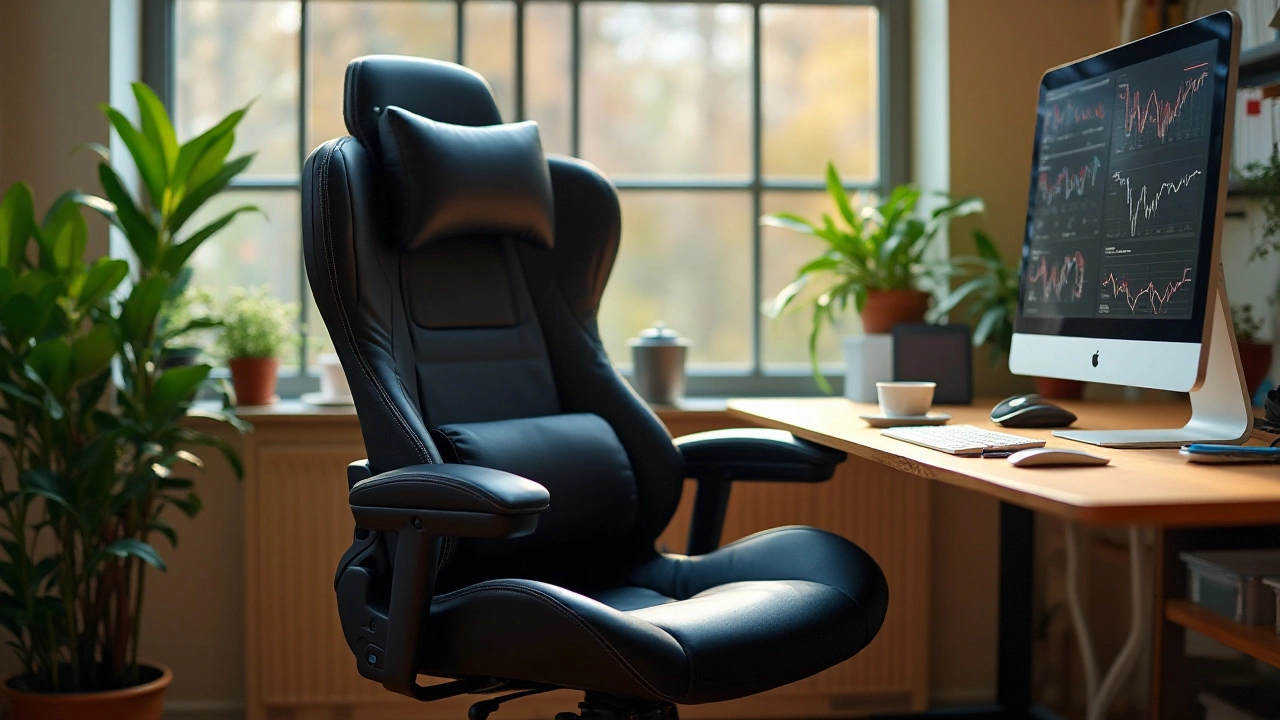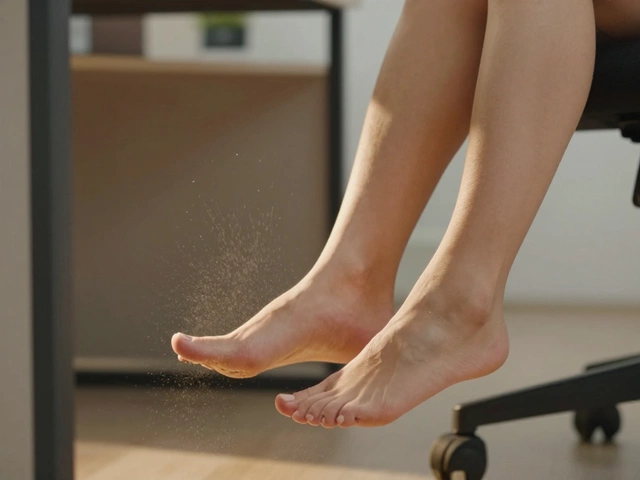Many of us spend a substantial part of our lives sitting at a desk, making the choice of a chair incredibly important. The significance of a quality office chair is often underestimated, yet it plays a pivotal role in our health and productivity. Imagine trying to concentrate while experiencing nagging back pain or aching wrists. This is where a well-designed chair can make all the difference.
Quality office chairs are built to offer support that fits your body, promoting good posture and reducing the risk of musculoskeletal disorders. It's not just about comfort—it's about taking proactive steps to care for your well-being during those long hours of sitting. From improving focus to boosting energy levels, the right chair is an investment in both your professional life and your health.
- Importance of Ergonomics
- Health Benefits of a Quality Chair
- Choosing the Right Chair
- Long-term Impacts
Importance of Ergonomics
When discussing the importance of office furniture, the term 'ergonomics' often emerges as a pivotal concept. Ergonomics, in essence, revolves around designing office tools, like an office chair, so they naturally align with the human body's natural posture and movements. This scientific principle is crucial because poor sitting posture can lead to numerous health problems, including back pain, neck strain, and even carpal tunnel syndrome. Consider the average worker, who, on a busy day, may spend upwards of eight hours seated. Without the right ergonomic support, these long hours can take a significant toll on one’s well-being.
Preserving health isn't just a benefit, it's a necessity. When you invest in an ergonomic office chair, you’re harnessing a blend of science and artistry. These chairs typically come with features like adjustable seat height, lumbar support, and armrests to reduce the risk of strain on the neck and shoulders. Each element is designed to adapt to the unique contours of different body types. Adjustability is key because the ideal chair for one person may not be ideal for another. Leveraging these customizable settings allows you to set a chair to the optimum position for your height, desk, and specific tasks.
Beyond comfort, the right ergonomic design can directly influence work efficiency and even psychological well-being. A well-supported body is less likely to be distracted by discomfort or fatigue, streamlining the ability to focus on tasks. As workers gather increased comfort and reduced stress levels, their overall mood and satisfaction also tend to improve, creating a more cohesive and productive work environment.
Consider a study conducted by Cornell University, which found that employees using ergonomic chairs reported fewer pain complaints and higher productivity levels. A statement from the study notes:
"Proper ergonomic practices significantly reduce the incidence of musculoskeletal problems in office settings, which in turn enhances both job satisfaction and productivity."This illustrates how an investment in ergonomics pays dividends not only in workplace happiness but also in economic terms through enhanced productivity.
Ergonomically designed office equipment, particularly chairs, supports the idea that investing in well-being is investing in efficiency. With awareness growing, modern office spaces, whether at home or in corporate environments, are increasingly focusing on incorporating ergonomic principles. Understanding this importance encourages individuals to prioritize health, leading to long-term benefits that extend well beyond mere comfort.
Ultimately, whether at home or in a professional setting, the choice of an ergonomic office chair is a step towards a healthier lifestyle. By ensuring that we support our bodies as we work, we are taking proactive measures to protect ourselves from long-term health issues, all while boosting our capability to perform at our best. Remember, the right chair is not an accessory; it is an essential tool in today’s work environment.

Health Benefits of a Quality Chair
It might seem like just a piece of furniture, but an office chair has a profound impact on your health, particularly if it is one of quality. For those who spend many hours seated at a desk, a good chair is indispensable in maintaining a healthy posture. By providing the necessary support, it aligns the spine, reducing strain on your back muscles. This support not only helps in preventing back pain but also minimizes tension in your shoulders and neck. This can be especially crucial for people who are prone to hunching over their desk without realizing it.
Another surprising health benefit of a high-quality office chair is its potential to improve circulation. Sitting for long periods can cause blood flow issues, leading to swollen ankles and varicose veins. Chairs designed with ergonomics in mind often come with features like seat height adjustability and a tilted seat that can promote better circulation. By adjusting the chair so that your legs sit comfortably, you allow blood to flow freely, reducing the risk of these health concerns. Ergonomic support can also alleviate pressure on the hips and lower back, further enhancing your bodily comfort.
Beyond the structural benefits, a quality chair can also make a significant difference in your energy levels and mental health. Being physically comfortable reduces fatigue, stress, and irritation. This physical comfort can have a direct impact on psychological well-being. When your body feels good, your mood tends to improve, and you find it easier to concentrate on tasks at hand. Moreover, studies have shown that comfortable seating arrangements at work are linked with increased productivity and reduced absenteeism due to health-related issues. An ergonomically designed office chair is thus an essential tool in the maintenance of both physical and mental health, which ultimately promotes a more productive work environment.
"Ergonomic work environments are not only a smart investment in the health of employees but also in the long-term health of the company," said Dr. James Levine of the Mayo Clinic, highlighting the intertwined nature of worker health and productivity.
Investing in a quality chair is an investment in your health. Poor postural support from a substandard chair can result in discomfort becoming a daily detriment. On the flip side, a well-constructed chair aims to mold itself to your body’s needs, supporting just the right areas. This attention to detail improves your seating habits, and good habits are inherently beneficial to health. Many experts believe that when repetitive strain injuries are avoided, the workplace becomes not only a place of productivity but a place of comfort and happiness too. The financial investment in a good chair pays dividends in terms of reduced healthcare costs and a more energetic, healthy lifestyle.

Choosing the Right Chair
Finding the office chair that is perfect for you is a journey into the heart of comfort and productivity. It's not merely about finding something to sit on for eight hours a day. It's about finding a companion that supports you through every task and project, whether you're firing off emails, diving into a spreadsheet, or brainstorming your next big idea. Consider your work habits and needs. Do you prefer leaning back deep in thought, or do you need a seat that keeps you upright and focused? No matter your style, there's an option designed to match it. The key lies in understanding what different chairs offer and how they can complement your routine.
One of the most critical aspects to consider when picking a chair is its ergonomic design. This means it's crafted to fit the natural curve of your spine, offering proper lumbar support. Chairs like these can help prevent chronic back pain and even reduce fatigue by supporting correct posture throughout the day. Look for features that let you adjust the seat height, backrest angle, and armrest position. These adjustments allow you to personalize the fit, making sure the chair truly works for your body, rather than the other way around. A comfortable, adjustable chair can have a tremendous impact on your daily comfort and, ultimately, your performance.
"Invest in a chair that comforts you throughout your day. It is a tool, as significant to your productivity as any computer or notepad," says ergonomics expert Dr. Linda Brown.
When sizing up options, materials play a big role in durability and comfort. Mesh backs are known for promoting air circulation, keeping you cool and preventing the dreaded sticky back syndrome. Leather and high-quality fabric often give a sense of luxury and warmth, suitable for both home and traditional office settings. Pay attention to the padding as well; memory foam can offer excellent support and comfort, molding to your body over time. A balance between firm support and soft cushioning can keep you in prime working condition for hours on end.
Beyond comfort and materials, total adjustability is essential in a ergonomic office chair. Some chairs come equipped with features like a tilt function or synchro-tilt mechanism, which encourages natural movement by letting the back and seat adjust in harmony. Others offer a swivel base and casters for easy movement across your workspace and prevent strain from reaching distant corners of your desk. This flexibility ensures that the chair can adapt to a broad range of activities, from typing away at a desk to relaxing during a phone call.
Making the Investment
Choosing the right office chair is less about the immediate expense and more about long-term investment in your health and productivity. A good chair can last for years, making the upfront cost pale in comparison to the comfort and support it provides over time. Studies have shown that investing in ergonomic solutions can lead to a reduction in work-related discomfort by as much as 61%, which speaks volumes about their impact on workplace well-being.
| Feature | Importance |
|---|---|
| Adjustability | Personalizing fit for increased comfort |
| Lumbar Support | Prevents lower back pain |
| Material | Affects comfort and temperature control |
| Durability | Ensures long-lasting use |
Understanding all these elements empowers you to make an informed choice. As you sit day in and day out, let your chair be a partner in your work environment. Don't rush the decision; test a few options if possible. Feel the support, test the settings, and picture it in your everyday use. Remember, a chair isn't just a piece of furniture; it's a core element of your workplace ecosystem that supports both body and mind.

Long-term Impacts
Among the often-overlooked components of a thriving work environment is the humble office chair. It might not seem pivotal at first glance, but when the long-term implications of using a poorly designed chair are weighed, the reality can be quite surprising. Over the years, the cumulative effects of maintaining poor posture while seated can lead to chronic back pain, neck stiffness, and even nerve damage. These issues not only diminish one's quality of life but can result in increased absenteeism and reduced productivity. When considering the life-span of the average office worker, the importance of investing in a high-quality chair becomes even more apparent. Providing substantial ergonomic support, such chairs can help in preventing the gradual onset of musculoskeletal problems that are common in sedentary lifestyles.
From a health perspective, quality ergonomic chairs are designed to follow the natural curve of the spine, ensuring that the back is fully supported. This feature alone can transform a regular workstation into a space where good posture is the default, not the exception. Poor seating options, on the other hand, often force individuals into awkward positions that strain the body. Over time, such strain can impede circulation, putting undue pressure on the lower back and contributing to long-term health issues. Investing in a chair that aligns with your body's needs promotes not just physical well-being, but mental sharpness as well. Feeling physically at ease can significantly reduce stress levels, which literature suggests, translates into a more focused and efficient work performance.
Moreover, there's evidence suggesting that individuals who make use of well-designed chairs experience fewer respiratory issues. This is because good posture facilitates better lung function, allowing for deeper breaths and improved oxygen flow throughout the body. This subtle improvement in breathing can have powerful implications for focus and stamina, thereby affecting productivity in ways that are often underestimated. In the modern world where remote work and hybrid models are becoming increasingly common, providing employees with optimal seating can make a profound difference in maintaining efficiency and health.
The long-term financial benefits of investing in high-quality office chairs should not be ignored either. Companies that prioritize ergonomics often notice a drop in health insurance claims and fewer requests for time off due to injuries or discomfort. Employees who are physically comfortable and free from pain are generally happier and more productive, contributing to a reduction in turnover rates and creating a more stable workforce. Living free from the regular discomfort brought about by inadequate seating allows employees to focus on their tasks entirely without any avoidable distractions.
Ultimately, the long-term impact of a good office chair cannot be overstated. It's an investment not just in furniture, but in health, happiness, and work efficiency. According to a report by the American Journal of Industrial Medicine, ergonomic interventions, including appropriate seating, have the potential to reduce worker compensation costs by a significant margin. By integrating comfort and functionality into our workspaces, we pave the way for success and sustainability, making the workday a much more enjoyable and productive experience.



